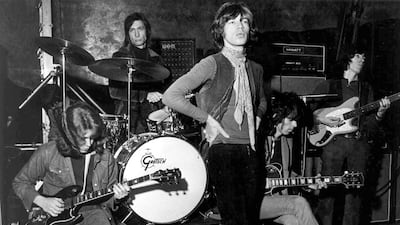The Rolling Stones always viewed themselves as a blues band rather than a rock juggernaut. Never has this been more true than the short-lived stint with their former guitarist Mick Taylor, from 1969 to 1974.
It may be a dip in the ocean when compared with the band’s five-decade career, but as any Rolling Stones fan will tell you, the five-year gap was one of the group’s most fruitful periods.
For diehard fans, Taylor was involved in The Rolling Stones albums that matter. For the critics, his classy and lyrical guitar work added some weight to the band’s oeuvre – proving they had the musicianship to match the attitude.
Born in 1949 in England’s Hertfordshire, the prodigious Taylor began performing as a teenager, forming bands and performing with schoolmates.
His first major impression on the music world was the result of seizing the moment. Eric Clapton – at the time a member of John Mayall & the Bluesbreakers – was a no-show for the band’s British gig in 1966. A 16-year-old Taylor – whose band were the support act – volunteered to step in for the guitar king.
Impressed by his sophisticated technique blending jazz and blues, Mayall soon invited Taylor to temporarily join the Bluesbreakers.
Three years later, Mayall recommended Taylor to Mick Jagger. The Rolling Stones singer was looking for a new guitarist after the band parted ways with the hard-partying Brian Jones. The musical chemistry between Taylor, Jagger and Keith Richards was immediate. For Jagger, the new axeman provided the melodic ingenuity he could feed off as a singer.
As for Richards, the addition of Taylor’s smooth playing was a welcome counterpoint to his choppy riffs.
As a Rolling Stone, Taylor was part of the group’s golden period when they released the classic albums Sticky Fingers (1971), Exile on Main Street (1972), Goats Head Soup (1973) and It’s Only Rock ’n’ Roll (1974).
As well as the landmark hits spawned, the four albums represented The Rolling Stones at their most musically developed; Taylor played an integral part in that growth.
In Exile on Main Street’s successful single Tumbling Dice, he not only played the slide guitar but doubled up on bass since Bill Wyman didn’t show up to the studio on that particular day.
While it started off as a throwaway country track, Taylor managed to transform Honky Tonk Women into a chart-topping rocker courtesy of some sturdy riffs.
With Taylor leaving the group in 1974 – citing numerous disagreements with Jagger and Richards over songwriting credits – The Rolling Stones’ musical adventurism was significantly curtailed.
Fortunately, both camps have reconciled and his guest appearance at the du Arena performing a few songs with The Rolling Stones should be a welcome reminder of the musical prowess he contributed to the main act.
sasaeed@thenational.ae


